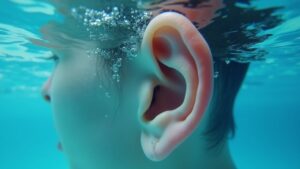Ever felt like your ear’s trapped in a quiet swimming pool? That muffled, underwater sensation isn’t just annoying—it’s your body hinting at something off-balance. Perhaps it’s pressure changes from a cold, wax buildup, or even allergies messing with your Eustachian tubes. The positive news? Simple tricks like chewing gum or yawning can often clear it up fast. But in case it sticks around, there’s more to uncover about what’s really going on.
Common Causes of Muffled Hearing Symptoms
Whenever your hearing suddenly feels like you’re underwater, it’s not just annoying—it can be downright unsettling.
One common culprit is earwax buildup, which blocks sound from traveling clearly through your ear canal.
Earwax buildup can muffle sounds by blocking the ear canal, making everything seem distant and unclear.
Middle ear infections often lead to fluid buildup behind your eardrum, creating pressure in the middle ear and muffled sounds.
In case your Eustachian tubes aren’t working right—maybe from sinus infections or congestion—they can’t balance pressure properly, leaving your ears feeling stuffed.
Even air pressure changes, like during flights, can cause temporary muffled hearing until your ears adjust.
These issues are usually fixable, so don’t panic. Simple causes like wax or congestion often clear up with minimal fuss, but it’s good to know what’s behind that underwater sensation.
Potential Underlying Conditions Affecting Ear Sensation
Since that underwater feeling in your ear won’t ease up, it’s worth checking whether something deeper could be going on.
Several conditions can mess with your ear’s normal function, making sounds seem muffled or distant, like you’re underwater.
Here’s what could be behind it:
- Eustachian Tube Dysfunction (ETD): Should these tiny tubes get blocked by nasal congestion or allergies, pressure builds up, distorting sounds and creating that underwater effect.
- Earwax Build-Up: Too much wax traps sound waves, making everything feel dampened or muffled.
- Middle Ear Infections: Fluid accumulation from infections can press on your eardrum, altering how you hear.
Other possibilities include allergic reactions swelling your Eustachian tubes or even a perforated eardrum.
Should it be persistent, see a healthcare professional—they’ll pinpoint the cause and help you get back to clear hearing.
Effective At-Home Remedies for Immediate Relief
In case that underwater feeling in your ear won’t quit, you don’t have to just wait it out—there are simple ways to ease the discomfort right at home.
Start by tilting your head to the side with the affected ear down, gently tugging your earlobe to help water or fluid drain. Chewing gum or yawning can open your Eustachian tubes, relieving pressure and muffled hearing.
Try the Valsalva maneuver: pinch your nose, close your mouth, and blow gently to pop your ears. A warm compress held against the ear for 20 minutes might ease fullness and encourage drainage.
Should congestion’s the issue, over-the-counter decongestants could help. These home remedies often bring quick relief, but in case they don’t, it’s best to check with a doctor.
When to Seek Medical Attention for Persistent Symptoms
How long is too long to put up with that clogged, underwater feeling in your ear?
Should it’s been more than a month or comes with other troubling signs, it’s time to consult a healthcare provider. Persistent symptoms could point to foundational conditions like Eustachian tube dysfunction or an infection needing proper assessment.
Here’s at what time to seek medical attention:
- Pain or swelling—especially with fever or discharge, which might signal an infection.
- No relief from home remedies—provided the discomfort lingers after a few days of trying.
- Sudden hearing changes—like dizziness or muffled sounds, which could mean something serious.
Don’t ignore these red flags. Prompt treatment options can save you from worsening issues. Your ears deserve care, not just patience.
Preventative Measures to Avoid Future Ear Issues
Should that clogged-ear feeling keep coming back, you’re not stuck with it forever—simple habits can help stop problems before they start.
To prevent water from entering your ears, wear earplugs designed for swimming; they’ll keep your ear canal properly protected. After swimming or showering, tilt your head to each side and gently dry your ears with a towel to avoid muffled hearing or swimmer’s ear.
Should you deal with nasal congestion, try a saline spray to keep Eustachian tubes clear and reduce pressure. Skip cotton swabs—they push wax deeper and raise the risk of ear infections.
Staying hydrated and managing allergies also helps your ears stay healthy. Small changes now mean fewer problems later.
Conclusion
Envision your ear as a tiny diver struggling to balance pressure in choppy waters. At the moment that underwater sound lingers, it’s your body’s way of waving a flag—something’s off. Simple tricks like yawning or chewing gum can be your life raft, but should the tide not turn, don’t hesitate to call in the experts. After all, even the deepest dives need a steady hand to resurface safely.




